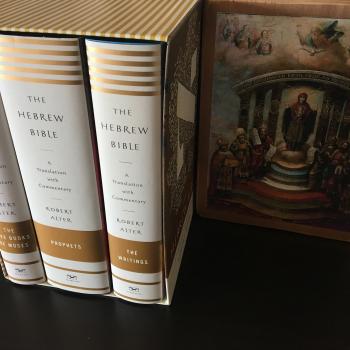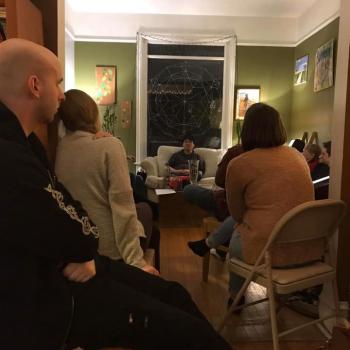![The entire TMNT at the Nickelodeon booth! - by SDCC13 - TMNT, Uploaded by daisydeee, William Tung from USA (SDCC13_-_TMNT_(9348046202).jpg) (CC BY-SA 2.0 [https://creativecommons.org/licenses/by-sa/2.0/deed.en]), via Wikimedia Commons](https://wp-media.patheos.com/blogs/sites/721/2017/12/SDCC13_-_TMNT_9348046202.jpg)
I should have been shredded by Shredder. But it was the turtles who were beating me. My parents thought that this was strange. They knew that I loved the Turtles. As a suburban boy in Fremont, California, I had all the Turtles merchandise a kid could want: the videos, the activity book, the coloring book, the socks, even the underwear. I wanted to be the Turtles. I wanted to fight like them. I especially loved Donatello and Michelangelo. They were the first two Turtles that my grandpa had introduced me to in the Nintendo video game, which was the first video game I’d ever played. Grandpa would shout at me in his Shanghainese accent to get that bad guy and the other one. Of course, we were invincible because we played with Game Genie.
Then it dawned on my dad. The Turtles had a master. He was a rat called Splinter, and he was a Zen master. He often taught the Turtles how to meditate. My dad was getting his master’s in theology at a Pentecostal Bible college in Oakland at the time. My obsession with the Turtles must have been from the evil spirits. In the name of Jesus, we cleaned house. Everything went into the trash – the videos, the activity book, the coloring book, the socks, and the underwear.
A few years later, the obsession was with the Power Rangers. Their fighting was pretty cool too, and I had to watch the show every day. But then, there were these twelve-year-old Cantonese-speaking ‘big brothers’ who came to visit us in Fremont from Vancouver. I looked up to them. They saw me watching the Power Rangers and said that a seven-year-old should not be watching something so violent. My parents agreed. So the Power Rangers had to go too.
In sixth grade, I learned about a new kind of computer game called a ‘strategy game.’ It was called Warcraft II. Before Warcraft, I played Nintendo and Super Nintendo, and usually the characters go across the screen. Even in the Zelda games, the idea was that you had one character, Link, traversing the map. But with Warcraft, there were lots of characters, and you built stuff. You could take your human army and attack the orcs. Sometimes the orcs would attack you too. The guy who introduced me to Warcraft, a kid my age whose dad had struck it rich as a CEO in the computer business, used to laugh at me because I’d never play the orcs. He loved playing orc and leaving human bodies on the map splayed in blood and skeletons. I thought that was disgusting. My friend thought that was adorable. He gave me a CD with Warcraft II on it so that I could play it at home. Someday, maybe I’d be good at it.
My Pentecostal sixth grade teacher caught me at school with the Warcraft strategy book. I liked to make charts and graphs with Warcraft characters to up my game. He took one look, though, and told me to read Deuteronomy 18. Here’s the relevant passage, in the version I read back in the day:
When you enter the land the LORD your God is giving you, do not learn to imitate the detestable ways of the nations there. Let no one be found among you who sacrifices his son or daughter in the fire, who practices divination or sorcery, interprets omens, engages in witchcraft, or casts spells, or who is a medium or spiritist or who consults the dead. Anyone of you who does these things is detestable to the LORD, and because of these detestable practices the LORD your God will drive out those nations before you. You must be blameless before the LORD your God. (Deuteronomy 18.9-13 New International Version).
I read that at my piano teacher’s house while I was waiting for my sister to get done with her lesson. It really bothered me. Even the humans in Warcraft had mages. I therefore went to my dad to ask him what I should do in light of this new knowledge. He told me that we’d probably have to throw the game away. So in the name of Jesus, we prayed over the CD and cast it into the trash can. When my friend found out, he was so mad. He said that I could have just given it back.
I used to tell each of these stories as part of my public testimony. It’s why I’m comfortable writing about them here. They really happened. The takeaway that my parents always impressed on me was that God has been really strict with me since I was a child. He must be preserving me for some calling. We were evangelical, so that most certainly did not mean the priesthood. Catholics, after all, were not Christian. I was generally open for anything, but I really hoped it wouldn’t mean I’d have to be a missionary to China. I heard it’s hot in China. I’m from the Bay Area. The weather is mild. Africa was another place I didn’t want to go. It was hotter than China.
Our interpretation of the divine strictness at the time was that I was being preserved as pure. If that is so, then God was inconsistent. I was as obsessed with Captain Planet as I was with the Turtles, but I never had a dream about the New Age Movement. Power Rangers may have been violent, but so were the Bruce Lee movies that my dad introduced me to in that same year . My sixth grade teacher didn’t know that while I was playing Warcraft, my friends were also getting into Starcraft and Age of Empires, which I also liked and which also have magical people. Shortly after throwing away the Warcraft CD, I got a Nintendo 64. I’ve beaten Zelda: Ocarina of Time over six times. I know how to use magic.
What’s more, my real obsession was with The Chronicles of Narnia and Lord of the Rings. I was also raised on Disney movies, which have witches and ghosts and goblins (and racism too). Oddly enough, my dad had a book about why The Little Mermaid was demonic because of the teenage rebellion stuff. Because of that, they also weren’t fine with me watching Pocahontas because of the indigenous spirituality. Beauty and the Beast was ok, though, despite the entire premise being that the whole castle was enchanted because of that stupid floating magic rose. I need not bring up why I was necessarily very late to the party when it came to Harry Potter, but I was pleased by the time the series ended to dub J.K. Rowling the finest Anglican theologian of our age. That was around the time I was really obsessed with Anglicanism, but I still agree with this assessment, even more so now in fact with the new Cormoran Strike series she writes as Robert Galbraith.
Because I am so far from those fundamentalist Protestant roots of mine from Chinese evangelicalism, I haven’t given my testimony of selective escape from the occult for quite some time. Certainly, I still get a pang of guilt when I watch a movie with the Turtles, although the truer truth is that I still do not know if I can stomach Megan Fox, who is Pentecostal, in the role of April O’Neil. I hear a new Power Rangers movie is out too. To be honest, I also thought the new trailer for The Battle for Azeroth was lit. I may not know anything about World of Warcraft because I threw the Warcraft II CD away, but it does not take an avid gamer to love a good battle sequence.
I am thinking about all of this because of where my liberation theology series left off. It was supposed to be a neat and tidy set of essays, tracing how my slow realization that Radical Orthodoxy was imperial British ideology humorously led to my conversion to Eastern Catholicism through the Umbrella Movement and then to liberation theology by reading Paulo Freire seriously during my catechumenate and mystagogy. As I wrote more, it got out of hand. I had treatments of ideology, an account of my dabbling in psychoanalysis, and then several psychoanalytical accounts of my own journey. By the end, I wound up doubling down on my claim that Lauryn Hill is the greatest theologian of our generation because her account of liberation is a freedom from fantasy. Fantasy, I ended up arguing in conclusion, is the realm in which most of contemporary oppression truly takes place.
A friend of mine joked on my last post that I do not seem to know what the word final means. He’s right. I’m writing another series. It’s on fantasy – and worse, it’s on how my scholarship is about the work of people’s fantasies. I am not sure what it has to do with my childhood dreams and encounters, but maybe there’s something there. Eventually, I might get back to that old testimony. But at this point, it’s just a feeling.















